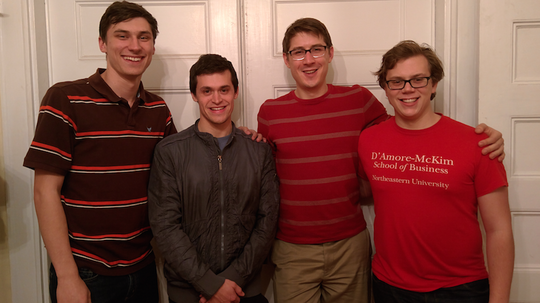
We’re coming up on that time when people look back on the year past, do some profound reflection and make plans to improve for the one to come. It’s no different in the startup scene. (Except that it typically matters more if ventures meet their annual goals than if you keep your New Year’s resolution to drink less.)
So in honor of the spirit of the season, we’re taking a look at student-led startups that made their mark in 2015 - and that we expect to do great things in 2016.
I was strict. I took two criteria into consideration while compiling this list: 1. These are “student startups.” That means there has to be at least one founder who’s currently a student at one of Boston’s many academic institutions. And 2. I only considered ventures that launched a product or service this past year. So startups could have technically been founded in 1854, but as long as they didn’t make whatever they’re offering available to the public until 2015, they’re fair game.
Here are the 7 campus companies that made the cut.
Wizio (Northeastern): When this website, which crowdsources authentic information about apartment listings from current tenants, launched this fall, it generated considerable buzz in Boston. In exchange for sharing all of the nitty gritty details about an apartment - the ones that real estate agents would never disclose for fear of losing a deal - Wizio lets users find and lease their next residence through the site sans signing fees. Within the next year, the founders plan to add features to the website, including the actual leasing process capabilities.
Tekuma (MIT): A team at MIT launched Tekuma after no one showed up to a design project presentation they did for their Master’s in Architecture. Through this venture, artists can have their work displayed and purchased at pop-up galleries held in Airbnb apartments. At the same time, Airbnb hosts are able to boost their places’ aesthetic appeal, making it easier to rent out their apartments. This past month, Tekuma hosted a spontaneous gallery at Art Basel in Miami, Fla. According to the company’s site, they’ve recently taken on a Director of Growth to curate the collections that Tekuma features and to handle the logistics for all of the pop-galleries that are to come.
Confi (Harvard): For this year, Confi has been focused on building up their website, which features doctor-verified, yet still approachable content about women’s personal and sexual health. And while the venture will continue its efforts to expand readership (half of which is currently male) and produce more user-friendly content, it’s also using the next year to test out revenue streams. Confi is planning to sell merchandise, in addition to hosting events throughout Boston. These two additions for 2016 will allow the venture to keep on addressing women’s most embarrassing health questions, while also making money.
VetX (Babson): In October, VetX launched its iOS app. It’s aimed at connecting pet parents with veterinarians for information about their animals. Owners can get generic intel about pet care, or, if something seems to be wrong with their animals, they can have on-demand consultations to determine if their pets need immediate medical attention. Basically, VetX is hoping to eliminate false-alarm vet visits that end up costing owners a big chunk of change. In the coming year, the startup intends to release a Droid version of its app on Google Play so more pet parents can reap the benefits of its services.
Tumvi (Boston University): Tumvi is a spinoff from BU Food, the original app developed to let students at Boston University see what’s on the menu near them. The team used BU Food to work out all of the kinks. From there, the team added new features, like a nutritional tracker, and made the app for the generic college community throughout the U.S. After Tumvi’s private beta wraps up, the venture is planning on bringing it to several strategic campuses in the country and expanding from there.
Vala Collection (Harvard): So far, Vala Collection has only set up its mini boutiques full of curated artisanal inventory in St. Louis and Los Angeles. However, there’s definitely a pop-up on the docket for New York this summer (as well as talks of a Boston one around Valentine’s Day). The venture also has sights on taking on team members and forming partnerships with emerging designers and artisans, so customers that come across Vala Collection’s tiny boutique will be in for an entirely unique shopping experience.
PICCPerfect (Babson): Coming off a strong Kickstarter campaign in April, PICCPerfect cleaned up in the campus pitch circuit this year. The venture sells functional and fashionable PICC line covers to patients with chronic illnesses. It took first place both at Purdue University’s The Big Sell business competition and our local Beantown Throwdown, and it was named the Student Business of the Year at Babson. In 2016, PICCPerfect will hopefully keep the momentum going, adding covers in different colors, designs and children’s sizes. Also, the venture will be expanding its brand and developing new lines of products, such as a shower sleeve.
Image on file.








